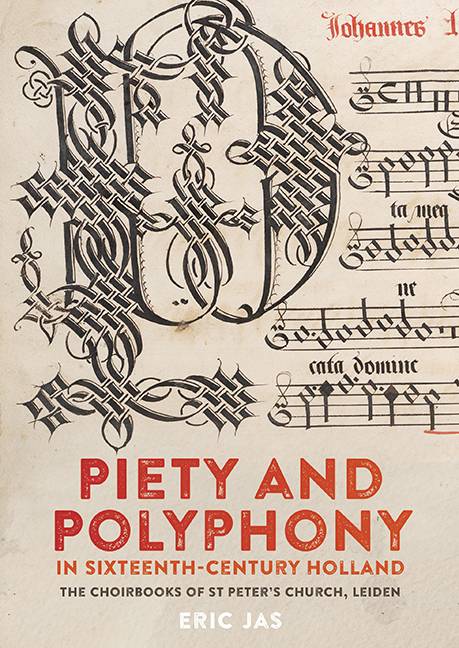Book contents
- Frontmatter
- Contents
- List of Illustrations
- Preface and Acknowledgements
- List of Abbreviations
- Introduction
- 1 The Zeven-Getijdencolleges
- 2 The Seven Hours in St Peter's Church at Leiden
- 3 The Choirbooks of St Peter's Church
- 4 The Repertoire of the Choirbooks
- Epilogue
- Appendix 1 Archival Documents
- Appendix 2 Descriptions and Inventories of the Choirbooks
- Appendix 3 Watermarks
- Alphabetical List of Compositions
- Alphabetical List of Composers
- Concordant Manuscripts and Printed Editions
- Bibliography
- Index
- Studies in Medieval and Renaissance Music
3 - The Choirbooks of St Peter's Church
Published online by Cambridge University Press: 17 October 2019
- Frontmatter
- Contents
- List of Illustrations
- Preface and Acknowledgements
- List of Abbreviations
- Introduction
- 1 The Zeven-Getijdencolleges
- 2 The Seven Hours in St Peter's Church at Leiden
- 3 The Choirbooks of St Peter's Church
- 4 The Repertoire of the Choirbooks
- Epilogue
- Appendix 1 Archival Documents
- Appendix 2 Descriptions and Inventories of the Choirbooks
- Appendix 3 Watermarks
- Alphabetical List of Compositions
- Alphabetical List of Composers
- Concordant Manuscripts and Printed Editions
- Bibliography
- Index
- Studies in Medieval and Renaissance Music
Summary
IN several cities in the province of Holland services of the zeven-getijdencolleges were enhanced by polyphonic music. The earliest record of singing “in discant” in St Peter's goes back to 1434. When Jacob Tick was hired as zangmeester in 1453 he was involved in three weekly services including polyphonic music. In the middle of the fifteenth century, singing “in discant” was also a known practice in Delft (see pp. 30–31). Over the years the performance of polyphony by the more important getijdencolleges became customary practice. Account books and manuals show that, with a certain regularity, new music was copied and that some getijdencolleges boasted an impressive collection of choirbooks. The singers of the getijdencollege in Haarlem had twelve books in 1546, containing polyphonic hymns, Magnificats and Marian antiphons (see p. 24). In 1523, the Delft getijdenmeesters had some of their books repaired. Among the eight volumes that are mentioned there was a Mass book opening with a Kyrie by Obrecht. The chapter of St Mary in The Hague and the church of Our Lady in Dordrecht, too, had a number of manuscripts containing polyphony. Taken together, the important churches in the province of Holland must have had an impressive collection of musical manuscripts. Unfortunately, the major part of that collection has been lost. Quite miraculously the six Leiden choirbooks from the mid-sixteenth century escaped destruction. These manuscripts, which were copied on the instigation of the zeven-getijdencollege in St Peter's, give an excellent impression of the repertory that was available to singers in mid-sixteenth century churches in Holland.
The matter of provenance and dating of these manuscripts is easily answered for three of them. Manuscripts 1438, 1439 and 1440 all have a colophon indicating that they were copied in the years 1549 and 1559, and in which the scribe identifies himself as Anthonius de Blauwe. Before studying these manuscripts and their history in more detail, we need to know who this Anthonius de Blauwe was and why the getijdenmeesters ordered their lavish books from him.
ANTHONIUS DE BLAUWE
The earliest document to name Anthonius de Blauwe in Leiden is an account of the memorial masters of St Peter's of 1546. The account states that a certain “meester anthonis” was living in a house on the Vollersgraft and had paid a rent of 5 stuivers and 6 penningen.
- Type
- Chapter
- Information
- Piety and Polyphony in Sixteenth-Century HollandThe Choirbooks of St Peter's Church, Leiden, pp. 85 - 141Publisher: Boydell & BrewerPrint publication year: 2018



